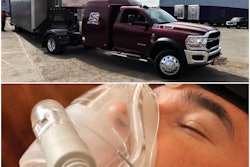After four hours of back-and-forth deliberation Wednesday afternoon by the Federal Motor Carrier Safety Administration’s Medical Review Board over how to help truck drivers who use CPAP machines included in the massive Philips recall announced this summer, the waters seem to be murkier than before the meeting.
The task given to the MRB by the agency was to develop recommendations for truck drivers and medical examiners on how to handle the situation if their device (or their patient’s device) is included in the recall.
However, at the meeting’s conclusion, the main recommendation that seemed likely to emerge from MRB is one that could potentially put drivers using the recalled Philips CPAP devices in an even more difficult position than before.
The big problem people with recalled devices are facing is that there are very few replacement CPAP devices available – from any manufacturer, not just Philips. The recall itself put a strain on the number of devices available, but exacerbating the problem is the semi-conductor chip shortage that is affecting production of just about every other piece of technology in the world.
A suggestion was made early in the meeting that one potential stopgap measure for truck drivers looking for a CPAP alternative is oral appliance therapy, which includes a device worn in the patient’s mouth while he/she sleeps to open up the airway. Annelise Thornton, the CEO of Population Sleep who initially made the suggestion, said the oral appliances could be used as a bridge solution in certain patients with moderate obstructive sleep apnea.
That suggestion turned into hours of debate over the efficacy of oral appliances and whether they would suffice in place of a CPAP. Experts weighed in throughout the meeting and determined that oral appliance therapy could work for certain sleep apnea patients in the moderate range.
[Related: CPAP recall leaves truck drivers with sleep apnea between a rock and a hard place]
Likely first recommendation
The Board seems poised to make a recommendation that any truck driver with diagnosed severe sleep apnea that is untreated, whether due to CPAP availability or other reasons, will be automatically disqualified from receiving their medical card until they can obtain a CPAP device.
As someone who grew up in a trucking family and has worked around the industry for most of my adult life, I’m empathetic to the issues truckers face, and I don’t want to see any safe drivers lose their job. However, when it comes to medical issues like untreated sleep apnea that could put the motoring public at risk, a line has to be drawn somewhere – and the MRB was in agreement on that, just not where the line should be drawn.
I’m still not certain which range of apnea-hypopnea index (AHI) the Board considers moderate and severe, despite much debate over the issue throughout the meeting. The initial thought from members of the MRB was that an AHI of 20 or greater would be considered severe, and an AHI between 5 and 20 would be considered moderate. However, experts in sleep disorders argued that in sleep medicine, an AHI of 30 or greater is considered severe.
Likely second recommendation
Another action item I see emerging from the Board's likely recommendations goes back to the oral appliance debate. Ultimately, the MRB decided that for drivers with recalled Philips CPAP devices, “appropriate oral appliance usage” will be accepted for medical card recertification, but only until CPAP machines are available again for treatment.
It’s the second part of that potential recommendation that’s problematic. Truckers for a Cause sleep apnea support group co-founder Bob Stanton commented during the meeting, noting that the cost of oral appliance therapy ends up being around $4,500 due to the appliance itself, plus the follow-up treatment. Compare that to the roughly $1,500 price tag of a CPAP.
Since many truck drivers have high-deductible health insurance policies, it’s hard for me to believe truckers will be jumping through hoops to go spend $4,500 on a device that they’ll only be able to use temporarily.
[Related: History suggests sleep apnea's path to regulation in trucking]
The biggest reason for MRB not going all-in on the oral appliance therapy as a permanent sleep apnea treatment, as far as I could gather during the meeting: a lack of compliance tracking to make sure drivers are actually using the devices and that they’re working properly to keep drivers’ AHI low.
I understand the importance of treatment, but I just don’t think the Board members understand or care that spending $4,500 on a device that can only be used for a few months, maybe a year, or however long it takes for CPAPs to become available again ... That's not going to feasible for an untold number of America’s truck drivers.
On top of the cost issue, MRB also determined they will only allow medical examiners to issue one medical card extension up to a maximum of 90 days for truckers with moderate sleep apnea to “provide evidence of appropriate treatment” for sleep apnea.
John Varela, vice president of sleep medicine for WorkSTEPS, said drivers would be waiting at least four to five months before they're able to provide that evidence if they try to switch to the oral appliance therapy. He noted the time it would take to get a consult with a dentist to even determine if the driver’s mouth would work with the device, another three or more weeks to get the appliance made, then more time to get the follow-up sleep test to make sure the appliance is working properly.
I’m no mathematician, but if Varela’s numbers were correct, drivers might be sitting a month or two after that 90-day card expires before being able to recertify and get back on the road. For any owner-operator without a good-size nest egg, that could be a death knell for the business.
At the conclusion of the meeting, Dr. Gina Pervall, chairwoman of the MRB, said, “This is not a perfect answer, but I think it’s a good answer.” I can only agree with the first half of her statement.
While we won’t know for certain what MRB’s official recommendations are until published on the MRB’s website (be on the lookout for coverage of those here on Overdrive in the coming weeks), I get the feeling truck drivers are once again at the bottom of a bureaucratic hill, and we all know what tends to roll downhill …
[Related: Inside the divide between docs and Congress, truckers over sleep apnea]










